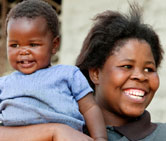New PROMISE study aims to go beyond preventing HIV transmission to preserving health
 Even though rates of HIV transmission from mothers to children have dropped dramatically in the United States, progress has been slower in many other countries, especially resource-poor regions. An estimated 430,000 children worldwide became infected with HIV in 2008, mostly through birth or breastfeeding from an HIV-infected mother. Although many regions are gaining increased access to the complex drug regimens known to prevent such transmission, questions remain about whether such regimens are really better than simpler drug regimens in terms of safety, efficacy, feasibility, and cost-effectiveness.
Even though rates of HIV transmission from mothers to children have dropped dramatically in the United States, progress has been slower in many other countries, especially resource-poor regions. An estimated 430,000 children worldwide became infected with HIV in 2008, mostly through birth or breastfeeding from an HIV-infected mother. Although many regions are gaining increased access to the complex drug regimens known to prevent such transmission, questions remain about whether such regimens are really better than simpler drug regimens in terms of safety, efficacy, feasibility, and cost-effectiveness.
On January 15, researchers funded by the National Institute of Allergy and Infectious Diseases (NIAID) and the NICHD launched the Promoting Maternal-Infant Survival Everywhere—or PROMISE—study. The aim of this study is to determine how best to reduce the risk of HIV transmission from pregnant women to their babies during pregnancy and breastfeeding, while still preserving the health of these children and their mothers.
Investigators will enroll nearly 8,000 HIV-infected women who are pregnant or have recently given birth and about 6,000 HIV-exposed infants in the PROMISE study, from as many as 18 countries of varying levels of resources.
PROMISE, led by the NIAID/NICHD-funded International Maternal Pediatric Adolescent AIDS Clinical Trials Network, addresses four research issues and most volunteers will participate in multiple components of the study to provide data for multiple issues.
- Determine which of two proven strategies is safer and more effective at preventing mother-to-child HIV transmission before and during delivery.
- Compare the safety and efficacy of two methods of preventing mother-to-child HIV transmission during breastfeeding.
- Examine the effects of short-term use of a three-antiretroviral-drug regimen during pregnancy and breastfeeding to prevent mother-to-child HIV transmission on the health of HIV-infected mothers who do not yet need treatment.
- Preserve the health of HIV-exposed, but uninfected infants by giving antibiotics to infants until the infant has stopped breastfeeding and is known to be HIV-uninfected.
PROMISE researchers, led by a chairperson from the Makerere University–Johns Hopkins University Research Collaboration in Kampala, Uganda, expect results in five to six years.
For more information on the PROMISE study, visit the NIAID Web site at https://www.nichd.nih.gov/newsroom/releases/071816-PROMISE
For more information on NICHD-supported research on HIV/AIDS, select a link below:
- NICHD A to Z Health and Human Development Topic: HIV/AIDS
- All NICHD News Releases on HIV/AIDS
- NICHD Pediatric, Adolescent, and Maternal AIDS (PAMA) Branch
- PAMA Branch, Report to the NACHHD Council, June 2007 (Note: This is a scientific document geared toward an audience of researchers and scientists.)
- AIDS Awareness Month and the NICHD (Previously Posted NICHD Spotlight)
Originally Posted: January 22, 2010

 BACK TO TOP
BACK TO TOP